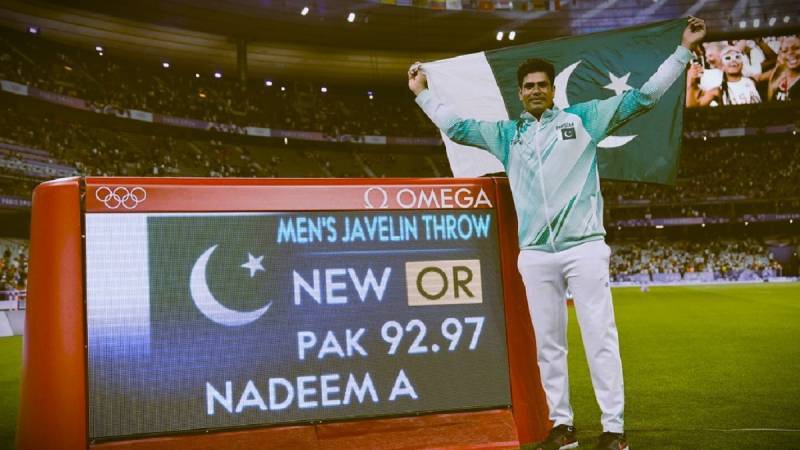
While the nation celebrated Arshad Nadeem's gold medal in the Paris Olympics, to suggest that Pakistan does not deserve the medal would be akin to raining on the parade. The point is simple: two years ago, at the Commonwealth Games, Arshad Nadeem was recognised along with weightlifter Nooh Dastgir Butt, the boxer Ilyas Hussain, and sprinter Shajar Abbas amongst others. Many such athletes defied the odds without much official patronage. It is not clear if that changed the status quo either, evident through how Butt blamed the authorities for his absence from the Paris Olympics. As such, can the country really assume this Pride when it has had a minimal role in its production?
Politicians, businessmen, and celebrities like Ali Zafar have announced various awards for Arshad Nadeem. This response appears to be more reactive than proactive. It is less about nurturing an athlete and more a PR exercise by cashing in on the glory of another.
Is the amount of work for an event in Paris any different from that required for an event in Thailand? Or is our response a reflection of our internalised norm that a Eurocentric/Western event commands more attention than one outside the Western world? After all, the media attention on Nadeem raises the question that similar spotlight and awards have not been conferred upon another gold medallist, such as Amir Khan, at the World Taekwondo Championships in Thailand.
Or is the disparity in response about the difference between one hailing from Punjab (Arshad Nadeem from Mian Channu) and another from Khyber Pakhtunkhwa (Amir Khan from Swat)? After all, the hero narrative of someone from humble origins making it big is common to both Nadeem and Khan. Where Nadeem could not afford a javelin, Khan had to borrow just to fly to Thailand for the competition.
Or perhaps the difference in response has been informed by external reactions as throngs of Indians could connect with Nadeem's classic struggling hero story. For Pakistanis struggling with an ongoing political and economic crisis such a response from a people otherwise influenced by a Hindutvist narrative can be quite validating. As is, many Pakistanis on social media seem to push conciliatory overtures towards Indians and seek to underscore that they, too, have been feeling dejected on account of the establishment.
A more controversial point could be that Arshad Nadeem does not deserve the gold medal any more than Nooh Dastgir Butt or other Pakistani athletes that did not score a medal at the Paris Olympics
Some get carried away by questioning the very genesis of their country and its founder. But it's not clear whether such overtures will find much currency across the border as many Indians ascribe to a nationalistic narrative much like Pakistanis follow a religious one. For Indians, the motherland comes first, and their grievances include charges of cross-border terrorism, which has hurt Pakistan itself through the proliferation of splinter groups — LeT, TTP, JeM and so on.
Returning to the issue of desert, deservingness, or merit, a more controversial point could be that Arshad Nadeem does not deserve the gold medal any more than Nooh Dastgir Butt or other Pakistani athletes that did not score a medal at the Paris Olympics. This point is drawn from Tom Malleson's book Against Inequality, based on which it can be argued that the talent within is the random luck of the draw and that even the ability to persevere itself is to a great extent biologically determined. After all, not everybody can become an elite athlete or has the constitutional makeup to bear gruelling training sessions.
Thus, to some extent the fame found by Arshad Nadeem seems to be conferred upon him, much like Arshad Khan, the blue-eyed chaiwala, found his fame by virtue of having an intrinsic attribute - a gift of nature, random luck of the draw, the result of parents' prayers, or Allah ka karam (God's fortune).
Yet another issue that arises is what people really value in the market? We have celebrities who can give away cash prizes as if the financial amount were nothing, whereas many talented athletes struggle just to make ends meet.
Not to be too harsh on Pakistan, this problem traverses borders, as it has been reported that some Olympians have turned to OnlyFans, where they sell their naked bodies, to fund their athletic dreams.
Nonetheless, the moral norms of others should not be the focus of Pakistan.
In essence, what matters is that if Pakistan wants gold medals, then it has to invest by institutionally nurturing athletes. That way, instead of celebrating one Arshad Nadeem ex-post, Pakistan would nurture many such winners ex-ante. It's then that a case could be made that Pakistan truly deserved its gold.

